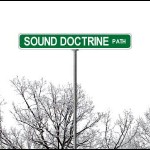Scripture… As We Live It #222
This is the 222nd passage in “Scripture… As We Live It.”
For by grace you have been saved through faith. And this is not your own doing; it is the gift of God, not a result of works, so that no one may boast. Since this is the only thing that is important, I’m going to stop writing right here. (Ephesians 2:8-9 re-mix)
(Please read the first post for an explanation of this series.)
Replay: Doctrine is not doctrine anymore
Four years ago, I wrote a post called “Doctrine is not doctrine anymore.” The point of the post is to consider how “doctrine” is usually viewed today as concepts or knowledge. But, to the authors of the New Testament, “doctrine” or “instruction” or “teaching” (all translations of the same word) goes much, much beyond concepts or knowledge and instead encompasses a way of life. Think about how much different our teaching would be if we were as concerned with a way of life instead of only facts.
—————————————
Doctrine is not doctrine anymore
In Acts 2:42, Luke begins to describe the response of those first Christians after receiving the promised Holy Spirit:
And they devoted themselves to the apostles’ teaching and fellowship, to the breaking of bread and the prayers. (Acts 2:42 ESV)
What does it mean that these early followers of Jesus “devoted themselves to the apostles’ teaching”? As long as I can remember, I’ve been taught that this means that they listened to sermons by the apostles, or at least by those who had heard sermons by the apostles. So, they “devoted themselves” or they “continued in” or they “persevered in” listening to someone teach them.
This sounds good. We all know that “teaching” or “doctrine” is a set of biblical fact, so it makes sense that those early believers would spend time listening to what the apostles had to say. They studied “doctrine” so that they would know what they needed to know.
But, there’s a problem with this picture. “Teaching” or “doctrine” or “instruction” (they are translations of the same word – no difference) in Scripture does not point to something that is simply known. Instead, “teaching” points to something that is demonstrated in both word and deed. Words alone would not be considered a “teaching”; but words combined with a living example would be considered a “teaching”.
Don’t misunderstand me… When I say “words combined with a living example”, I’m not talking about a sermon with application points. “Applications points” are still words. Instead, I’m saying that someone who brings a “teaching” or “doctrine” only does so when the life of the “teacher” matches the words and is demonstrated before the ones who are learning. In other words, a “teaching” combines both words and a way of living that is witnessed and imitated by those who are learning.
Consider Paul’s words to the church in Phillipi:
What you have learned and received and heard and seen in me – practice these things, and the God of peace will be with you. (Philippians 4:9 ESV)
Consider his reminder to the Thessalonians:
For we never came with words of flattery, as you know, nor with a pretext for greed – God is witness. Nor did we seek glory from people, whether from you or from others, though we could have made demands as apostles of Christ. But we were gentle among you, like a nursing mother taking care of her own children. So, being affectionately desirous of you, we were ready to share with you not only the gospel of God but also our own selves, because you had become very dear to us. For you remember, brothers, our labor and toil: we worked night and day, that we might not be a burden to any of you, while we proclaimed to you the gospel of God. You are witnesses, and God also, how holy and righteous and blameless was our conduct toward you believers. (1 Thessalonians 2:5-10 ESV)
Finally, in his letter to Titus, Paul specifically connects “doctrine” and “teaching” to more than words, as he parallels “teach what accords with sound doctrine” with “show yourself”:
But as for you, teach what accords with sound doctrine. Older men are to be sober-minded, dignified, self-controlled, sound in faith, in love, and in steadfastness. Older women likewise are to be reverent in behavior, not slanderers or slaves to much wine. They are to teach what is good, and so train the young women to love their husbands and children, to be self-controlled, pure, working at home, kind, and submissive to their own husbands, that the word of God may not be reviled. Likewise, urge the younger men to be self-controlled. Show yourself in all respects to be a model of good works, and in your teaching show integrity, dignity, and sound speech that cannot be condemned, so that an opponent may be put to shame, having nothing evil to say about us. Slaves are to be submissive to their own masters in everything; they are to be well-pleasing, not argumentative, not pilfering, but showing all good faith, so that in everything they may adorn the doctrine of God our Savior. (Titus 2:1-10 ESV)
Titus was to teach with his words, but just as importantly, he was to teach with his life. For Paul, teaching with words could not be separated from teaching with lifestyle. Of course, this means that Titus would have to live his life among those he was teaching. It was not enough to simply see them occasionally. In order to Titus to teach “sound doctrine” he would have to live “sound doctrine” with the people.
So, those early believers that Luke described in Acts 2 were devoting themselves to the words and lifestyle of the apostles. They heard what the apostles said, and they saw how the apostles lived. In response to this and to the Spirit’s work in their lives, they spoke and lived in the same way. They did not simply listen to sermons about what to belief. They heard, watched, and lived with the apostles and other believers, and learned from their “living doctrine”.
What does this mean for us? It means that when we make a list of “beliefs” and call it “doctrine”, we are not using the word “doctrine” in a scriptural sense. It means that when we stand before a group of strangers and give them good, biblical information, we are not bringing a “teaching” in the way that the word is used in Scripture.
Primarily, for those of us who desire to make disciples of Jesus Christ, it means that our lives must demonstrate what our mouth is saying. We must live among and with people who are learning from us. Teaching cannot be done at a distance to an audience of strangers. Teaching (in the scriptural sense) occurs when people share their lives together, not when the teacher stands behind a podium.
Helping each other follow Jesus
At the very basic level, a disciple is simple a learner. Around the first century, the term disciple took on a little more technical meaning referring to someone who followed the teaching and way of life of a particular teacher. For example, there were disciples of Socrates, disciples of Plato, disciples of Aristotle, disciples of John the Baptist, disciples of Pythagoras, etc. Anyone who learned from and lived by the teachings of a person was considered a disciple of that person.
Of course, for Christians, we are not concerned with being a disciple of just anyone. We want to be disciples of Jesus Christ. This means that we want to follow the teachings and way of life that were presented by him. When we talk about making disciples, we mean helping people following Jesus Christ. We do not want people to follow us, unless in doing so they are also learning to be disciples of Jesus. But, even when they follow us, we want them to understand that Jesus is their true master, not us. Our goal is for these people to stop following us and to begin following Jesus on their own.
Since Jesus is their master – and not us – our goal includes helping them to understand what Jesus desires of them, not what Jesus desires of us. Jesus may give me certain gifts, talents, resources, opportunities, and passions that he does not give to other disciples. I must not put myself in the place of Jesus and attempt to direct one of his disciples to live in the way that Jesus is calling me to live. Certainly, there will be some similarities in the way of life of any disciple of Jesus Christ, and this is where we can be most helpful to one another.
We can teach and demonstrate to one another what it means to love others in general, but we cannot tell each other exactly how Jesus desires for us to love others. We can help one another understand what it means to build up the church for works of service, but we cannot take the place of the master is ordering his disciples to edify others in specific ways. Thus, there are ways that we can help people follow Jesus, but we must not take the place of Jesus ourselves.
Of course, there are many ways that we can help each other follow the teachings and way of life of Jesus. For example, we can help each other read and understand Scripture. We can help each other learn to pray. We can encourage one another to show love and generosity and concern for others. In all of these, though, we must remember that our goal is following Jesus, not in completing specific activities. It is easy to get so caught up in activities that we forget that the purpose of those endeavors is following Jesus.
But, is it really important for us to help one another follow Jesus Christ? Apparently it was so important to Jesus that it was one of his final instructions to his original disciples: “Go therefore and make disciples of all nations…” (Matthew 28:19-20 ESV)
Are you helping people follow Jesus? How is Jesus using you to help others follow him?
How do we use the Old Testament to understand the church?
My friend Eric at “A Pilgrim’s Progress” has written a very good post called “Why do you ignore the Old Testament?”
The question that Eric raises is this: “In what way should the Old Testament inform our understanding of the church and how we should interact with one another?”
As he points out, some modern organizational structures among the church are often justified and explained by referring to similar structures found in the Old Testament. Eric suggests that this is a misuse of the Old Testament.
He especially points to the book of Hebrews in which the author identifies many of those structures as “shadows” that were meant to point to Jesus Christ.
The interesting thing, as one person mentions in the comments, is that the earliest followers of Jesus did not have the New Testament. And, they were exhorted to consider the Old Testament Scriptures as important for their lives (even for their learning, according to Paul).
So, I’ll ask you, how do we use the Old Testament to help us understand how to live with and interact with one another as God’s children?
How others use the word CHURCH… according to Google
In yesterday’s post, I answered the question, “What do I mean when I use the word CHURCH?” I said that I used the word “church” to refer to a gathering of God’s people.
But, how do other people use the word “church”? There are many ways to answer that question. If you check a dictionary, you’ll find that there are several different meanings to the English word “church,” and the word is used with even more referents (i.e., what the word “points to”).
I thought I would ask Google. So, I did a Google search on the phrase “what is church.” The top 8 results are listed below. (By the way, your results might be a bit different, because Google searches are relative to location, user, etc.)
1. According to the article “What is the Church?” on About.com:
The word “church” as rendered in the New Testament comes from the Greek term ekklesia which is formed from two Greek words meaning “an assembly” and “to call out” or “called out ones.” In summary, the New Testament church is a body of believers who have been called out from the world by God to live as his people under the authority of Jesus Christ (Ephesians 1:22-23).
2. According to Mark D. Roberts in his article “What is a Church?“: (Note: this is a very long article, and probably worth additional study…)
If an ekklesia is an actual meeting of people, then a “church” exists when Christians gather together. The physical meeting of believers is essential to a right understanding of church.
3. According to the article “What is the church?” by CARM:
The word “church” comes from the Greek “ekklesia” which means “gathering” or “assembly.” Therefore, the church is the gathering of the believers who come together to participate in fellowship with one another as they worship God and hear from His Word, the Bible.
4. According to the gotquestions.org article “What is the church?“:
Many people today understand the church as a building. This is not a biblical understanding of the church. The word “church” comes from the Greek word ekklesia which is defined as “an assembly” or “called-out ones.” The root meaning of “church” is not that of a building, but of people.
5. According to “What is church?” by Felicity Dale at “Simply Church”:
The New Testament uses a number of different pictures of church: church is Christ’s body (Rom 12:5); it is a temple built with living stones (I Pet 2:5), it is a family (Eph 2:19)… Similarly, church is relationships, but the difference between church and any other set of relationships is the presence of Jesus.
6. In the house-church.org article “What is a church?” the author doesn’t offer a definition (unless I missed it). However, there are many links on the page, so perhaps the answer is buried there somewhere.
7. The Wikipedia article “Churches of Christ” begins with this: (It’s not really a definition, but it gives us an idea of how the word “church” is being used.)
Churches of Christ are autonomous Christian congregations associated with one another through common beliefs and practices. They seek to base doctrine and practice on the Bible alone, and seek to be New Testament congregations as originally established by the authority of Christ.
8. In the article “What is a local church?” by Jonathan at the 9 Marks Blog:
A local church is a group of Christians who regularly gather in Christ’s name to officially affirm and oversee one another’s membership in Jesus Christ and his kingdom through gospel preaching and gospel ordinances.
Interestingly, after the top 8, most of the posts are actually different questions like, “What is church X,” where X could refer to many different things. Those articles do not define the term “church” either.
So, what do you think about these definitions? What does this tell us about the way people are using the English term “church” today?
Singing to one another
Josh at “In Search of the City” is asking a great question (and answering it, by the way) in his post “Sing to one another?” As he points out, most singing by Christians today is done to God or about God.
But, as Josh says, we often miss the scriptural exhortations to also sing to one another with the purpose of edifying one another.
After sharing a quote from Ephesians 5:19, he writes:
Here Paul encourages the saints to sing not only to God but to one another. In Colossians he says basically the same thing, only with an emphasis on teaching and admonishing one another through song (Colossians 3:16).
When was the last time you were part of a church meeting where the members sang directly to one another? Yeah, it’s been a while for me, too.
At any rate, it’s a great practice which I highly recommend.
Then, believe it or not, Josh actually shares the lyrics to a song that written to him as a gift.
I’ve noticed that many of the songs that we sing today are missing the “one another” aspect that is so important in Scripture.
Do you know of any songs that include or emphasize this aspect of our mutual relationships in Christ? (The last time I asked this question, I learned about a song that I had never heard before. I’m hoping for something similar this time.)
What do I mean when I use the word CHURCH?
Occasionally, I write posts to explain what I mean when I use certain terms. I’ll even write multiple posts over time about the same word or phrases for a couple of reasons: 1) my understanding and usage of the term/terms may have changed, or 2) new readers and commenters come to the blog.
Obviously, since I usually write about the church, the word “church” is a term that I use regularly. People mean many different things when they use the word “church,” and they refer to many different things when they use the word “church.” (Stay tuned for another post tomorrow when I examine some of these different usages and references…) (By the way, there is a difference between “meaning” and “referent.” That difference is an interesting study on its own if you have time to dig into it…)
As most of us know, the authors of the New Testament used the Greek term “ekklesia” to refer to gatherings of God’s children. This is what I mean when I use the English term “church.”
Now, the Greek term “ekklesia” itself does not refer to a gathering of God’s people. The term “ekklesia” means a “gathering” or “assembly” or any time. Around the time that the New Testament was written, “ekklesia” could refer to a political/civic gathering, religious assemblies, a military gathering, an unruly mob, even a group of animals. Even in the New Testament we find several of those different usages of the term “ekklesia.” I do not translate all of those as “church.”
Instead, I only use the English term “church” when the New Testament authors was referring specifically to a gathering of God’s people. Sometimes they would specify that they were talking about the “ekklesia of God” or the “ekklesia of Christ,” but sometimes they simply used the term “ekklesia” in the general context of God’s people. In each of those cases, I would use the term “church.”
So, today, when I use the term “church,” I do so only when I’m referring to a gathering of people who are God’s children (i.e., followers of Jesus Christ and indwelled by the Holy Spirit). And, when I’m referring to multiple gatherings, I will use the plural “churches,” just as the New Testament authors used the plural “ekklisiae” when referring to multiple gatherings. (For example, see Galatians 1:2, in which Paul addressed several gatherings in different cities in the region of Galatia.)
Now, I understand that people mean different things when they use the term “church.” So, I am very careful when I use the term, and often I will clarify exactly what I mean when I first use the term around a person or group. If there is confusion, then I will use another term such as “gathering,” “assembly,” “group,” etc… something that conveys the same idea.
I also understand that some people do not like to use the word “church” because of the baggage associated with that term. I appreciate their decision, and I empathize with them. If I’m around people who prefer not to use the term church to refer to a gathering of God’s children (and if I know of their preference), then I refrain from using it as well and instead use one of the other terms above.
So, hopefully, this helps you and others understand what I mean when I use the term “church” on my blog.
Tomorrow, I’m going to look at how other people use the term “church”… with a little help from Google.
Making a mess of the church?
Donald at “The Unapologetic Prophet” has written a very good post called “We have made the church a mess indeed, indeed.” Interestingly, his post is a continuation of a discussion that he started on a post here on this blog. (I love that kind of blogging, by the way – the kind that moves from place to place and continues and expands discussions…)
In his post, Donald is talking about how we have taken God’s design for the church that he created and how we have modified it and messed it up.
While there are several good points in his post, I want to point out these three:
1. We have taken that which is meant to be Unified, and sliced it apart for the sake of personal comfort though denominational labels. We have divided Her.
2. We have taken that which is meant to be lovely and virtuous, and scarred Her face and body with our failed theologies, our forced mandates, our religious expectations that serve to only damage Her and defy Unity.
3. We have allowed The World, through the futile machinations and manipulations of human politics, both Conservative and liberal, to invade The Church like a foreign army, shooting the wounded and taking prisoners as slaves.
Yep. In many ways, we are not reflecting the headship of Jesus Christ and his control over his body.
Of course, the body of Christ has always been a “mess”… reading any of the letters of the New Testament shows that humans consistently get in the way of what Jesus wants to do with his church. That doesn’t excuse it, of course.
The question is, are we willing to admit it, repent, and submit to him? Or, do we keep going on as we’ve been doing?
Until we are perfected, our lives individually and together will continue to be messy. But, are we also moving toward maturity (perfection) or are we happy living in our mess?
Summarizing Ephesians 1:3-10
Do remember back in English or Grammar class when you were taught to divide your papers and essays into paragraphs? Do you know why you did that? It wasn’t just to separate the paper into sections marked by indented lines. Paragraphs actually play an important part in writing and reading.
To begin, here is one definition of a paragraph: “A distinct section of a piece of writing, usually dealing with a single theme and indicated by a new line, indentation, or numbering.”
Now, while most modern languages delineate paragraphs with “a new line, indentation, or numbering,” this has not always been the case. However, the first part of that definition is extremely important: “a distinct section of a piece of writing, usually dealing with a single theme.”
You see, meaning is not primarily found at the word, clause, or even sentence level. Meaning is primarily found at the paragraph level. In paragraphs, authors present a single theme or topic or statement, which is then backed up, illustrated, or explained within the paragraph using words, clauses, and sentences. (So, you see, words, clauses, and sentences are important because they are the building blocks of paragraphs.)
One of the things that I like to do when I begin to study a section of Scripture is to divide that section into paragraphs and try to summarize each paragraph. It’s kinda like when your English or Grammar teacher told you to make sure that you have a topic sentence for each of your paragraphs when writing an essay.
Once I summarize the paragraph, it then becomes much easier to understand what the author is communicating through the various words, clauses, and sentences within that paragraph. It also helps me not to translate or interpret out of the author’s context.
I thought I would present this exercise to my readers and see what you come up with as a summary / topic sentence for a very important section of Ephesians. Consider this passage:
Blessed be the God and Father of our Lord Jesus Christ, who has blessed us in Christ with every spiritual blessing in the heavenly places, even as he chose us in him before the foundation of the world, that we should be holy and blameless before him. In love he predestined us for adoption as sons through Jesus Christ, according to the purpose of his will, to the praise of his glorious grace, with which he has blessed us in the Beloved. In him we have redemption through his blood, the forgiveness of our trespasses, according to the riches of his grace, which he lavished upon us, in all wisdom and insight making known to us the mystery of his will, according to his purpose, which he set forth in Christ as a plan for the fullness of time, to unite all things in him, things in heaven and things on earth. (Ephesians 1:3-10 ESV)
This is usually marked in most translations as a single paragraph. In fact, it’s probably one long sentence as well.
Thinking about the passage above as a whole, how would you summarize that paragraph / sentence? What topic sentence would you write to convey what Paul was communicating in that passage?
Letting go… to find real fellowship in Christ
Jim at “Crossroad Junction” has written a very good post called “Finding Ekklesia.” He touches on a subject that I’ve written about a few times as well.
I often get emails or phone calls or Twitter/Facebook messages asking something like this, “How do I find authentic fellowship?” Well, that’s what Jim’s post is all about.
And, before jumping ahead too much, don’t miss this statement at the beginning of his post:
As I’ve thought about this, it’s been hard for me to know how to respond. The last thing anyone needs is another “program”, “method” or “three easy steps” to find something that God designed to be authentically birthed, and sustained, organically.
Like Jim said, fellowship is something that we are designed for by God and empowered for by the Holy Spirit. So, if fellowship is natural for the follower of Jesus Christ, then why is it still so hard to find?
Jim touches on this later in his post:
Trust me. It really isn’t that hard. I have helped spark real fellowship time and again in different communities based on just that simple approach.
If that means letting go of the hurts that have defined you, then forgive and begin pursuing health.
If it means letting go of the sensibilities that have limited you, then let the washing of your mind through the power of His word begin to transform you.
If it means getting out of your lifeless funk, then maybe it’s time to get off your knees and start doing the things that bring you joy in the Lord – even if it is not “spiritual” – and then start expressing His resulting joy to others, because joy is life, and life is contagious.
(There’s much, much more in Jim’s post, so don’t stop reading with my excerpts.)
So, why is fellowship so hard for us? Because we don’t want to “let go”…










